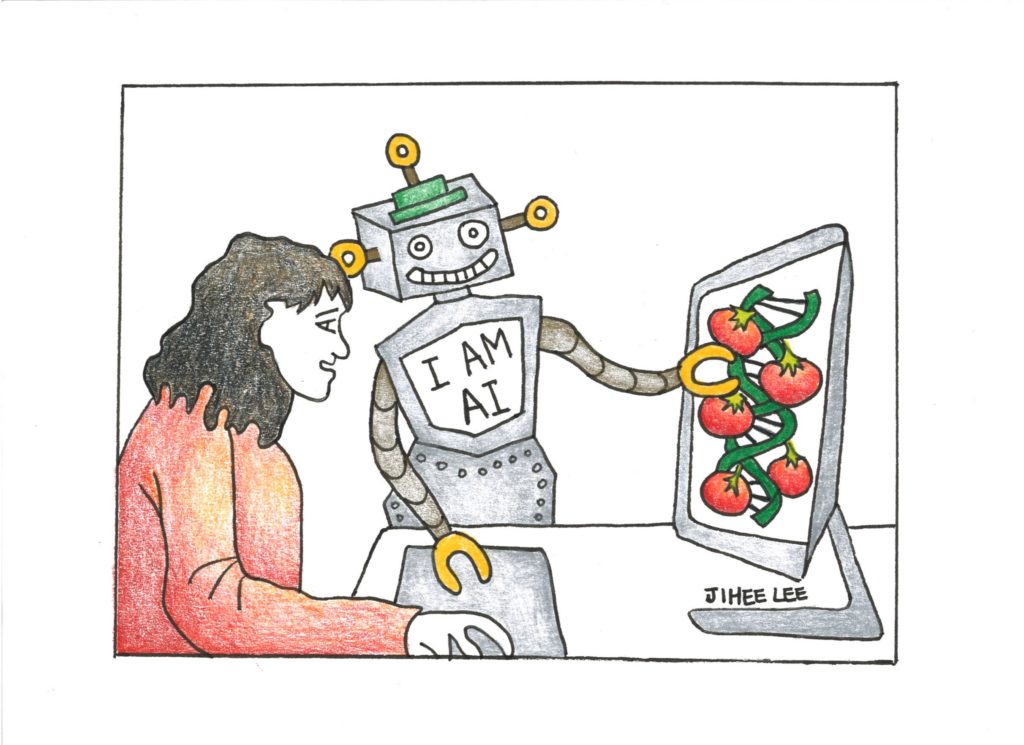
By Tong Geon Lee
Crop breeding has a long history of integrating the latest innovations in biology, genetics and mathematics to enhance yield and agronomic traits having commercial value. As artificial intelligence (AI) has slowly become integrated into agriculture, breeders and geneticists imagine an agricultural revolution with computer science techniques.
As scientists become increasingly familiar with AI, there has been a call for building a shared understanding of this computational approach between non-scientific and scientific audiences. This article is intended for a non-scientific audience and will briefly discuss the benefits of AI in crop breeding, with an emphasis on the genotype’s role in this process.
GENOTYPES AND PHENOTYPES
Approximately 200 years ago, Gregor Mendel, the father of modern genetics, discovered that plants follow rules when they pass their appearance traits (e.g., flower color) to their offspring. He defined the association between genotype (invisible to the human eye) and phenotype (visible information such as appearance traits), which enabled the initiation of modern crop breeding.
Studies in crop plants now routinely use DNA information that is invisible to the human eye. Once this information is collected using DNA sequencing machines, researchers can locate DNA regions (known as genotypes) associated with a particular phenotype. Therefore, such genotypes are now considered visible information that can make breeding decisions more efficient.
The primary goal of crop breeding is to improve on the traits that have commercial value. Such goals can be achieved through phenotypic selection. Crop breeding that relies only on choosing a visible phenotype (e.g., choosing breeding material with disease resistance, while discarding disease-susceptible progeny) has been historically effective. However, the integration of genotypes into phenotypes increases the efficiency of phenotypic selection for superior trait performance.
MANAGING INFORMATION OVERLOAD
We live in a time where we are perpetually flooded with information. Most of today’s breeders and geneticists wish to use the whole-genome sequencing technology to obtain complete genotypic information of a plant of interest and to select for superior genotype combinations. Such technology accumulates extensive information, which demands a specially designed facility, such as a high-performance computing server, to analyze and store it. Furthermore, crop breeders can evaluate thousands of genotypes individually, which far exceeds the competency of manual calculations and traditional mathematical approaches. AI studies and experiences the way in which humans think about information. Eventually, the AI-equipped computing system processes such large data quickly.
How can AI positively impact the breeding paradigm for those trying to enhance crop improvement? Breeding is an obvious long-term investment. Therefore, to satisfy the demands of the market in a timely manner, breeders and geneticists need to rapidly assess which breeding materials are the best parents to achieve a particular breeding goal. They will then cross them to recover progeny that will outperform the parents.
As mentioned earlier, we are faced with the daunting task of making sense of a flood of information. However, an AI methodology enables researchers to solve this issue by uncovering differences in breeder materials in ways that have never been possible before. For example, researchers can use machine learning, a type of AI, to train algorithms to recognize truly superior genotypes and to predict their phenotypic effects. In this approach, researchers can expect to significantly increase breeding efficiency by reducing the phenotyping efforts and cycle times necessary to achieve the development of a new cultivar.
Another example is the custom genotyping chip. Massive whole-genome scale genotyping efforts have recently been subject to machine learning methods to predict genotype associations with specific phenotype(s), permitting the development of cost-effective, easy-to-use custom genotyping platforms (i.e., genotyping chips) for specific breeding goals.
For example, machine learning projects which genotypes are associated with traits of interest and helps researchers select core genotypes to develop a custom genotyping chip. The costs associated with the experimental design, sample collection and data analysis and interpretation of custom chip-driven genotyping efforts are generally significantly cheaper than whole-genome scale genotyping.
CHALLENGES AND COLLABORATION
While these are exciting prospects, there are challenges involved with achieving a truly AI-assisted crop improvement. High-throughput phenotyping is now considered an essential component of crop improvement for major grain crops by both academic and commercial players. Although the phenotype is required to complete a selection cycle and genotype-phenotype association study via AI, the broad applicability of high-throughput phenotyping in vegetable and specialty crop breeding poses challenges to researchers.
For instance, tomato breeders recognize that there might be a technical challenge to collect red fruit images due to the presence of dense vegetative tissues and woody lateral branches under an open field cultivation system. It may be feasible to enhance the performance of important traits using AI-assisted genotype information. For such challenging traits where the phenotype is difficult to evaluate because of the associated expenses (e.g., human labor) or its dependence on specific tools, AI models may be used. AI can increase the probability of identifying truly favorable genotypes by focusing on current breeding materials that have the potential to achieve optimal traits (e.g., early shedding of leaves while exposing tomato fruits).
Large seed companies have been using AI (or AI-like approaches) for major crops for more than a decade, but less attention has been focused on vegetable and specialty crops. Continued success in breeding better crops, along with AI, depends on collaboration among groups with complementary expertise. With the support of stakeholders and funding agencies, AI will continue to evolve and create new opportunities for crop improvement.
Tong Geon Lee is an assistant professor at the University of Florida Institute of Food and Agricultural Sciences Gulf Coast Research and Education Center in Wimauma.









